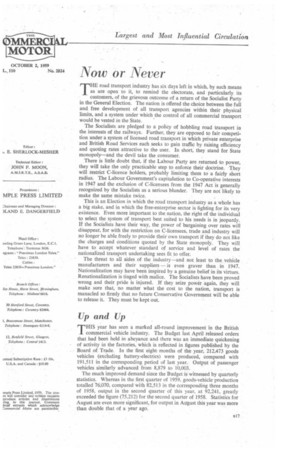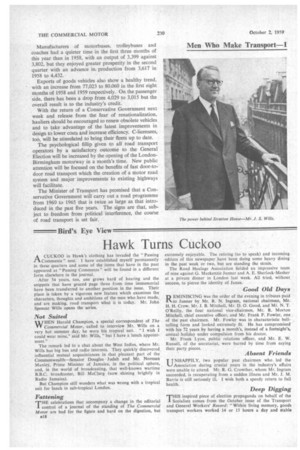Now or. Never
Page 51

Page 52

If you've noticed an error in this article please click here to report it so we can fix it.
THE road transport industry has six days left in which, by such means as are open to it, to remind the electorate, and particularly, its customers, of the grievous outcome of a return of the Socialist Party in the General Election. The nation is offered the choice between the full and free development of all transport agencies within their physical limits, and a system under which the control of all commercial transport would be vested in the State. The Socialists are pledged to a policy of hobbling road transport in the interests of the railways. Further, they are opposed to fair competition under a system of licensed road transport in which private enterprise and British Road Services each seeks to gain traffic by raising efficiency and quoting rates attractive to the, user. In short, they stand for State monopoly—and the devil take the consumer. There is little doubt that, if the Labour Party are returned to power, they will take the only practicable step to enforce their doctrine. They will restrict C-licence holders, probably limiting them to a fairly short radius. The Labour Government's capitulation to Co-operative interests in 1947 and the exclusion of C-licensees from the 1947 Act is generally recognized by the Socialists as a serious blunder. They are not likely to make the same mistake twice. . This is an Election in which the road transport industry as a whole has a big stake, and in which the free-enterprise sector is fighting for its very existence. Even more important to the nation, the right of the individual to select the system of transport best suited to his needs is in jeopardy. If the Socialists have their way, the power of bargaining over rates will disappear, for with the restriction on C-licensees, trade and industry will no longer be able freely to provide their own transport if they do not like the charges and conditions quoted by the State monopoly. They will have to accept whatever standard of service and level of rates the nationalized transport undertaking sees fit to offer, The threat to all sides of the industry—and not least to the vehicle manufacturers and their suppliers —is even graver than in 1947. Nationalization may have been inspired by a genuine belief in its virtues. Renationalization is tinged with malice. The Socialists have been proved wrong and their pride is injured. If they seize power again, they will make sure that, no matter what the cost to the nation, transport is manacled so firmly that no future Conservative Government will be able to release it. They must be kept out.
Up and Up
THIS year has seen a marked all-round improvement in the British 1 commercial vehicle industry. The Budget last April released orders that had been held in abeyance and there was an immediate quickening of activity in the factories, which is reflected in figures published by the Board of Trade. In the first eightmonths of the year, 212,473 goods vehicles (excluding battery-electrics) were produced, compared with 191,511 in the corresponding period of last year. Output of passenger vehicles similarly advanced from 8,879 to 10,003. The much improved demand since the Budget is witnessed by quarterly statistics. Whereas in the first quarter of 1959, goods-vehicle production totalled 76,070, compared with 82,513 in the corresponding three months of 1958, output in the second quarter of this year, at 92,241, greatly exceeded the figure (75,212) for the second quarter of 1958. Statistics for August are even more significant, for output in August this year was more than double that of a year ago. Manufacturers of motorbuses, trolleybuses and coaches had a quieter time in the first three months of this year than in 1958, with an output of 3,399 against 3,802, but they enjoyed greater prosperity in the second quarter with an advance in. production from 3,617 in 1958 to 4,432.
Exports of goods vehicles also show a healthy trend, with an increase from 77,023 to 80,060 in the first eight months of 1958 and 1959 respectively. On the passenger side, there has been a drop from 4,029 to 3,015 but the overall result is to the industry's credit.
With the return of a Conservative Government next week and release from the fear of renationalization, hauliers should be encouraged to renew obsolete vehicles and to take advantage of the latest improvements in design to lower costsand increase efficiency. C-licensees, too, will be stimulated to bring their fleets up to date.
The psychological fillip given to all road transport operators by a satisfactory outcome to the General Election will be increased by the opening of the LondonBirmingham motorway in a month's time. New public attention will be focused on the benefits of fast door-todoor road transport which the creation of a motor road system and major improvements to existing highways will facilitate.
The Minister of Transport has promised that a Conservative Government win carry out a road programme from 1960 to 1965 that is twice as large as that introduced in the past five years. The signs are that, subject to freedom from political interference, the course of road transport is set fair.












































































































































































































































